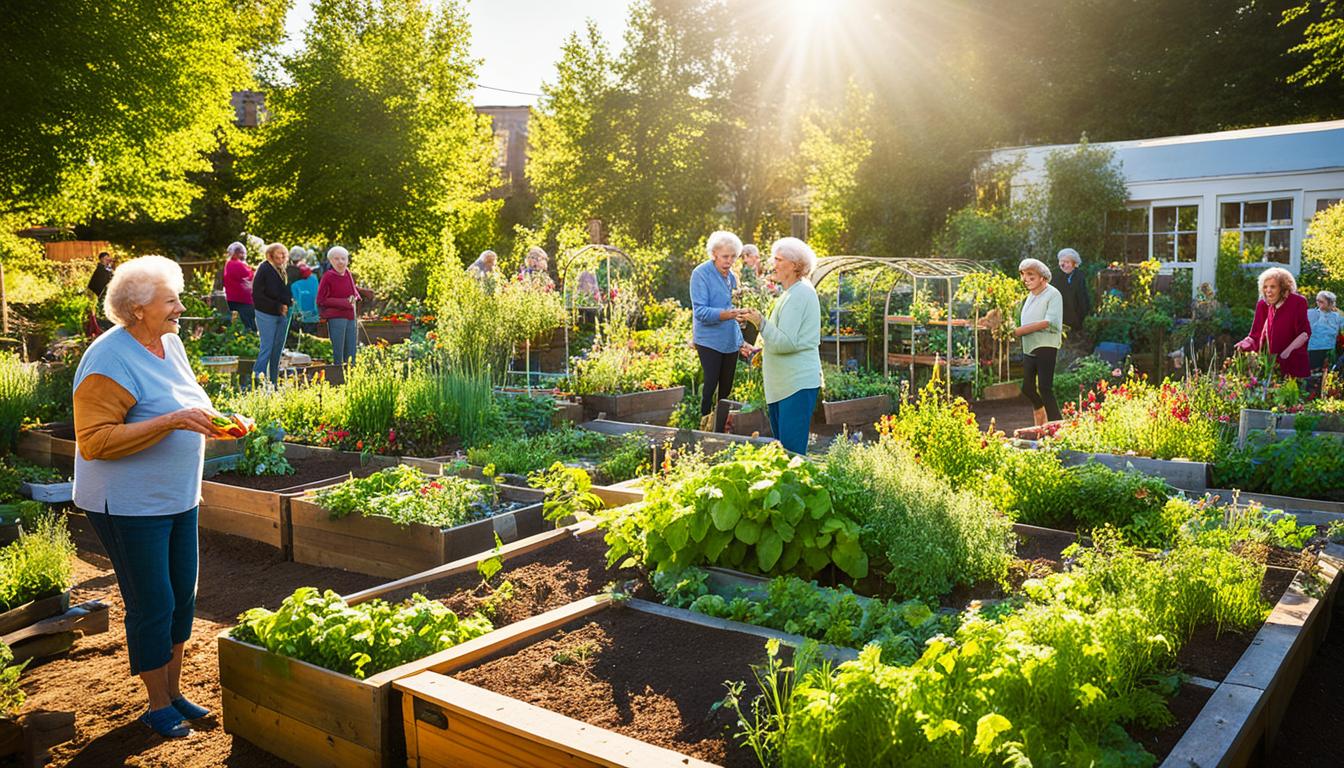
In 2025, we aim to improve the mental and emotional health of older women. We want to help them stay strong and positive. Connecting the mind and body is key. This connection can boost mental health among older women. So, how can we support our senior women’s mental well-being this way?
The answer is complicated but fascinating. Our behaviors, thoughts, and social lives all affect how we age. Research shows that half of the preventable deaths in the U.S. are due to unhealthy habits. These include not being active, smoking, how much we use our brains, how social we are, our personalities, and stress. Also, our friends and how much money we have play big roles in our health and happiness.
Being lonely can make us sick and even lead to death earlier. Not seeing people often can also cause health problems and early death. Scientists have found that our very nature can influence how long we live. For example, being careful and dedicated can help us live longer. It lowers the risk of Alzheimer’s. Meanwhile, being too anxious can impact our health in different ways.
Key Takeaways
- In 2025, we’re focusing on older women’s mental health and emotional well-being. We aim to make them stronger by understanding the connection between mind and body.
- Our actions and thoughts, like exercise, smoking, and how we think, are crucial for our health at any age.
- Our social life and how much money we have also matter a lot for our health and happiness.
- Feeling lonely and not being around others can have serious consequences, leading to early death.
- How we are as people can also affect how healthy we stay and the diseases we might avoid.
Understanding the Behavioral and Social Aspects of Aging
In 2025, knowing how mental health and emotions change in older women is vital. Ageing brings new challenges like physical and emotional struggles. These can impact how we think, our social life, and how we make decisions.
Cognitive and Emotional Changes in Normal Aging
At the National Institute on Aging (NIA), we study how aging affects thinking and emotions. We look at these changes and how they affect happiness, social life, and mental health. By understanding the science behind these shifts, we hope to help older women feel better.
Exploring the Interrelationships Between Emotion, Cognition, and Brain Function
Next, we’re digging into how our feelings, thinking, and brains interact. This research will help us make new treatments for older women’s needs. We aim to boost their strength, deal with anxiety, and prevent dementia by understanding these links.

Illuminating the Pathways of Social, Psychological, and Behavioral Factors
Exploring mental health and aging involves understanding connections between social, psychological, and behavioral factors. We aim to uncover how genes, environments, and behaviors mingle to impact senior women’s health. Our work will highlight these complex connections.
Multilevel and Interdisciplinary Research on Genes, Behavior, and Environments
Our goal is to delve into the interplay of genes, environments, and behaviors through diverse research. This means looking at how different aspects like genes, behaviors, and surroundings affect health. We hope this overview will give insights into mental health, well-being, and aging.
Identifying Biomarkers Linked to Aging-Relevant Social and Behavioral Phenomena
We aim to find key biomarkers related to social and behavioral changes in aging. By combining data from neuroimaging with broad surveys and studies, we can understand aging’s social and biological sides. This understanding is vital to develop support strategies for senior women’s mental health and well-being.

Identifying Early Life Exposures and Resilience Capacity
The National Institute on Aging (NIA) studies how early life impacts us in big ways. Exposure to tough social, personal, and physical settings early on can shape our health later. Things like where we live and how much money our families have can make a difference. For example, women with more education are less likely to struggle with memory loss as they get older.
Mechanistic and Epidemiological Studies on Adverse Environmental Exposures
NIA is working hard to understand these early-life influences. We support both lab studies and research about people to learn more. Our goal is to figure out how to lessen the negative effects of tough beginnings, especially for older women.
Incorporating the Geroscience Agenda in a Life-Course Approach
NIA also wants to look at people’s lives as a whole to understand their health journey. Using a life-course approach means studying health from start to finish. This includes looking at how our bodies age and what that means for sickness and injuries later on. The aim is to see how early life, the world around us, and aging fit together.
Exploring Mechanisms of Social Adversity and Disadvantage
How we act as older adults can be traced back to early life events. These include our social ties, skills, the places we live, and habits. Some people face disadvantages almost their entire lives. This can cause continuous stress and make diseases move faster. We need to understand how these tough social situations affect us, leading to more health risks and stress.
Examining the Malleability of Biobehavioral Risk Mechanisms
It’s key to look at how changeable these biobehavioral risks are. We can find ways to make them better (amelioration). Studying people from childhood to later life can show what these risks are. Because many health gaps and problems show up later, the NIA supports looking into how we age in this period.
Identifying Optimal Timepoints for Interventions to Reverse Early-Life Adversity
Figuring out when it’s best to make changes can help a lot. It’s important to know the best times to fix the effects of early-life troubles and ongoing stress. This can make life better for older women now and in the future, by boosting their mental health. The NIA is working to support studies that will help us all cope better with tough life situations. As more senior women need help, it’s important to learn how to build up resilience and lessen the harm of tough times on both mind and body.
mental health older women 2025
More and more older women are living in the United States. It’s very important to know what affects their health and happiness. The National Institute on Aging is focusing on this because it’s critical.
Understanding Decision-Making Processes and Motivation in Older Adults
Getting older changes how we think, feel, and decide. Life events, like our health getting worse, also change things. NIA is studying how these factors impact choices about retirement, social life, health, and more.
Being able to make good choices is key for staying mentally sharp. Problems making decisions could hint at dementia. NIA wants to understand how decision-making works as we age. This understanding will help create ways to support older people in making healthy life choices.
Investigating Social Factors and Networks Influencing Health Decisions
Our friends, family, and community shape many of our choices as we get older. NIA is looking at how these social contacts affect older women’s health choices. Their goal is to find out how to use these social ties to make women more resilient and help them make better decisions.
Understanding the factors that affect older women’s health choices is crucial. NIA is focused on research to find answers. They want to help this group live mentally healthier and happier lives.






